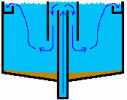

Types Of Sedimentation Basin
The common types of sedimentation basins are
- rectangular basins,
- square or circular basins and
- Solid contact clarifiers.
Rectangular Basins

Rectangular basin showing Inlet& outlet
Rectangular basins are the simplest design, allowing water to flow horizontally through a long tank This type of basin is usually found in large-scale water treatment plants.
Rectangular basins have a variety of advantages such as predictability, cost-effectiveness, and low maintenance. They are the least likely to short-circuit, especially if the length is at least twice the width. The inlet and outlet arrangements of rectangular basis are shown below.
A disadvantage of rectangular basins is the large extent of land area required.
Circular and Square Basins

Circular basin showing inlet and outlet
Square and circular sedimentation basins with horizontal flow are often known as clarifiers.
This type of basin short-circuiting problems. below Figure shows the inlet and outlet arrangements.
Solid-contact Clarifiers
A third type of sedimentation basin is more complex. Solids-contact clarifiers, also known as upflow solids-contact clarifiers or upflow sludge-blanket clarifiers combine coagulation, flocculation, and sedimentation within a single basin. Solids-contact clarifiers are often found in packaged plants and in 901d climates where sedimentation must occur indoors. This type of clarifier is also often used in softening operations.
Leave a Reply






 LIKE TO GET UPDATES
LIKE TO GET UPDATES  TO GET EXPERT GUIDE
TO GET EXPERT GUIDE